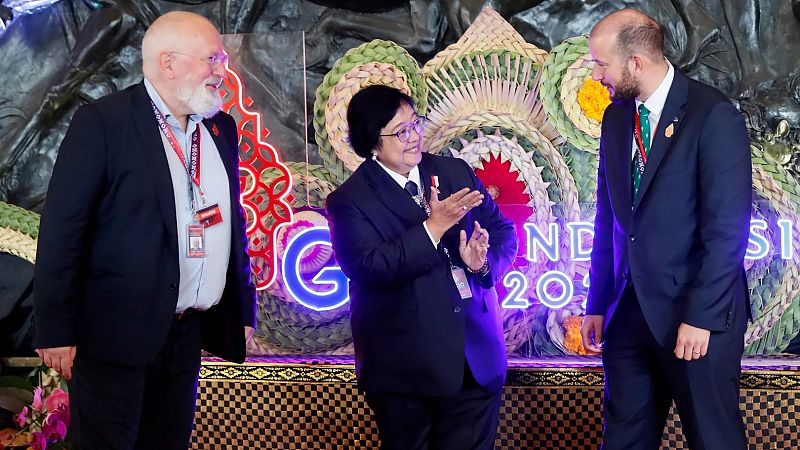A group representing EU taxpayers has submitted criminal reports to German local authorities and the European Union’s Public Prosecutor’s Office in Luxembourg, targeting former EU commissioners Frans Timmermans and Virginius Sinkevicius. The group is urging an inquiry into the two individuals regarding suspected illegal payments made to non-governmental organizations.
Both worked during the initial term of European Commission President Ursula von der Leyen, from 2019 to 2024. The Dutch national Timmermans held the position of Executive Vice-President and was in charge of Climate Action, whereas Sinkevicius, who currently serves as an MEP, was responsible for Environment and Oceans.
The grievances were submitted this week by the Taxpayers Association of Europe (TAE), an alliance of national European taxpayer groups and entities located in Munich and Brussels.
A statement from the TAE suggests there are concerns about possible illegal payments,
We therefore urge public prosecutors to examine if the relevant laws and the EU’s values of transparency and division of powers have been breached,” the statement mentioned, further noting, “If money was moved without proper supervision or input from other EU bodies, this would constitute an unacceptable breach of the existing legislation.
The grievance concerns media coverage suggesting that the previous EU Commission “provided significant funding to non-governmental organizations (NGOs) without clearly revealing these choices or providing sufficient justification,” according to a statement in which TAE President Michael Jäger is quoted.
“We are also focused on explaining the overall criminal responsibility of Commission officials regarding the EU’s financial assets. There should be no legal gap. As all Europeans are equal under the law,” the statement mentioned.
Reports in German media about NGO financing
A German newspaper, Welt Am Sonntag, reported in June that the EU administration had secretly given environmental organizations as much as €700,000 to support the union’s climate initiatives. The Commission rejected the claims of hidden payments and a representative stated that the executive maintains a high level of openness when it comes to funding NGOs.
Last month, three far-right political organisations failed in their attempt to create an inquiry committee regarding the matter at the European Parliament. Instead, the Parliament’s political leadersagreed to establish a working group inside the Committee on Budgetary Controlto examine how the Commission supports non-governmental organisations.
In the meantime, Nick Aiossa, director of Transparency International EU, stated that the allegations of NGOs engaging in shadow-lobbying for the Commission have already been refuted.
These tales have already been refuted and were shared in February,” stated Aiossa, continuing, “I truly fail to see why the German media would embrace this, unless, naturally, there is a more political motive at play from those responsible for leaking the documents.
Aiossa stated that the European Commission’s financial support for civil society organizations to engage in public discussions is positive, that a limited group of right-wing Members of the European Parliament were accountable for leaking confidential information to the media, and that Transparency would be submitting a legal complaint regarding this matter.
The claims about Welt emerged in February, and in April a parliamentary committee rejected a series of amendments proposed by right-wing politicians aimed at including strong criticism of EU funding for non-governmental organizations in the approval of the bloc’s 2023 budget.
The claims relate to European Union financial support for environmental non-governmental organizations through the LIFE operating grants. These are part of the EU’s LIFE initiative, which has a budget of €5.4 billion (2021–2027) designed to fund projects focusing on eco-innovation, circular economy, energy efficiency, wildlife protection, and reducing pollution. Approximately €15.6 million is set aside for environmental NGOs through operating grants, with each organization potentially receiving up to €700,000 per year under this system.
Grants are provided via open competitions that have well-defined eligibility rules, and non-governmental organizations are assessed not directly by the Commission but by entities like, for example, the European Climate, Infrastructure and Environment Executive Agency (CINEA) in the case of LIFE.
Promotion via lobbying is allowed but not mandatory or encouraged through the grants.
Every grant comes with a statement that “views and opinions expressed” by non-governmental organizations “do not always represent the position of the European Union.” The terms of the grants are open for all to see, and there is no obligation for applicants to have their goals match those of the Commission in order to obtain financial support.
The Court of Auditors characterized the funding system as ‘unclear’
In essence, non-governmental organizations maintain complete control over the usage of funds, provided they adhere to legal and contractual limits. They must follow transparency guidelines, promote European Union values, and undergo regular audits. Should they not carry out their planned activities, financial support may be terminated.
Although a significant portion of monitoring depends on self-reporting – a major weakness in the system – the Commission is improving its risk-focused verification process, as recommended by the European Court of Auditors.
In April 2025, EU auditors described the Commission’s financial procedures as “unclear” and highlighted possible damage to its image. Nevertheless, after a year-long investigation, they discovered no proof of any misconduct by either NGOs or European Commission staff.
Consequently, the Commission introduced updated guidelines last year to ensure EU financial support is not utilized for direct lobbying efforts targeting EU institutions due to these worries.
Jäger mentioned that he anticipated receiving initial replies from the two prosecution offices within approximately three months, signaling whether they would contemplate conducting an investigation.
As per the TAE, additional criminal reports have also been submitted in Austria concerning this matter.
The Commission, Timmermans, and Sinkevicius have been reached out to for their response.







